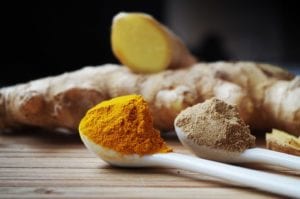Written by Greg Arnold, DC, CSCS. Two hundred mgs of a commercial curcumin formulation, when taken for 8 weeks, significantly improved blood flow and blood vessel health in participating subjects compared to those in the placebo group.
 Cardiovascular diseases, including heart disease and stroke, are the first and third leading causes of death for both men and women in the U.S. They account for 1 in 3 of all U.S. deaths and cost our healthcare system $473 billion in 2009 1. At the “heart” of cardiovascular disease is damage to blood vessels that hampers their ability to contract and relax correctly 2. As a result, finding ways to maintain blood vessel health can be a way to successfully manage heart health.
Cardiovascular diseases, including heart disease and stroke, are the first and third leading causes of death for both men and women in the U.S. They account for 1 in 3 of all U.S. deaths and cost our healthcare system $473 billion in 2009 1. At the “heart” of cardiovascular disease is damage to blood vessels that hampers their ability to contract and relax correctly 2. As a result, finding ways to maintain blood vessel health can be a way to successfully manage heart health.
In a 2016 study 3, 59 healthy, nonsmoking adults (male/female breakdown not provided) aged 19 to 25 received either 50 milligrams of a commercial curcumin supplement containing 20-28% of curcumin extract 4, 200 milligrams of the curcumin supplement, or a placebo for 8 weeks. The commercial curcumin supplement, CurcuWIN®, OmniActive Health Technologies Ltd., Mumbai, India, contained three curcumin antioxidants called “curcuminoids”: Curcumin (71.5%), demethoxycurcumin (19.4%), and bisdemethoxycurcumin (9.1%) 5. This form of curcumin has shown significantly higher absorption rates over standard curcumin 4 which is known to have very poor absorption 6.
Before and after the study, researchers tested blood vessel health with flow-mediated dilatation (FMD), measuring how quickly blood flows through a blood vessel, with greater blood flow indicating improved blood vessel health 7.
After 8 weeks, those in the 200 mg curcumin group experienced a 2.7% increase in flow-mediated dilatation (p < 0.007) compared to 1.4% decrease in the 50 mg curcumin group (p = 0.174) and a 0.3% decrease in the placebo group (p = 0.769). When compared to the placebo group, the 200 mg curcumin group results were statistically significant (p = 0.032) but were not significant in the 50 mg curcumin group compared to placebo (p = 0.234). No significance was reached regarding blood pressure between the groups (p = 0.12).
When suggesting how curcumin elicited these benefits to blood vessels, the researchers pointed to studies of curcumin’s antioxidants and anti-inflammatory properties 8,9. They went on to conclude that “In apparently healthy adults, 8 weeks of 200 mg oral curcumin supplementation resulted in a clinically meaningful improvement in endothelial function as measured by FMD. Oral curcumin supplementation may present a simple lifestyle strategy for decreasing the risk of cardiovascular diseases.”
Source: Oliver J.M. et al. Novel Form of Curcumin Improves Endothelial Function in Young, Healthy Individuals: A Double-Blind Placebo Controlled Study. J Nutr Metab. 2016;2016:1089653. http://dx.doi.org/10.1155/2016/1089653
© 2016 Jonathan M. Oliver et al. Open access under Creative Commons Attribution License.
Click here to read the full text study.
Posted November 28, 2016.
Greg Arnold is a Chiropractic Physician practicing in Hauppauge, NY. You can contact Dr. Arnold directly by emailing him at PitchingDoc@msn.com or visiting his web site at www.PitchingDoc.com.
References:
- CDC. Division for Heart Disease and Stroke Prevention At A Glance.
- Napoli C, de Nigris F, Williams-Ignarro S, Pignalosa O, Sica V, Ignarro LJ. Nitric oxide and atherosclerosis: an update. Nitric Oxide. 2006;15(4):265-279.
- Oliver JM, Stoner L, Rowlands DS, et al. Novel Form of Curcumin Improves Endothelial Function in Young, Healthy Individuals: A Double-Blind Placebo Controlled Study. J Nutr Metab. 2016;2016:1089653.
- Jäger R, Lowery RP, Calvanese AV, Joy JM, Purpura M, Wilson JM. Comparative absorption of curcumin formulations. Nutrition journal. 2014;13(1):11.
- Li S, Yuan W, Deng G, Wang P, Yang P, Aggarwal B. Chemical composition and product quality control of turmeric (Curcuma longa L.). 2011.
- Anand P, Kunnumakkara AB, Newman RA, Aggarwal BB. Bioavailability of curcumin: problems and promises. Molecular pharmaceutics. 2007;4(6):807-818.
- Corretti MC, Anderson TJ, Benjamin EJ, et al. Guidelines for the ultrasound assessment of endothelial-dependent flow-mediated vasodilation of the brachial artery: a report of the International Brachial Artery Reactivity Task Force. J Am Coll Cardiol. 2002;39(2):257-265.
- Liu ZJ, Liu W, Liu L, Xiao C, Wang Y, Jiao JS. Curcumin Protects Neuron against Cerebral Ischemia-Induced Inflammation through Improving PPAR-Gamma Function. Evid Based Complement Alternat Med. 2013;2013:470975.
- Quiles JL, Mesa MD, Ramirez-Tortosa CL, et al. Curcuma longa extract supplementation reduces oxidative stress and attenuates aortic fatty streak development in rabbits. Arterioscler Thromb Vasc Biol. 2002;22(7):1225-1231.
